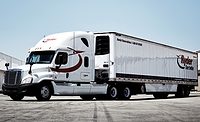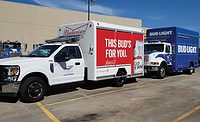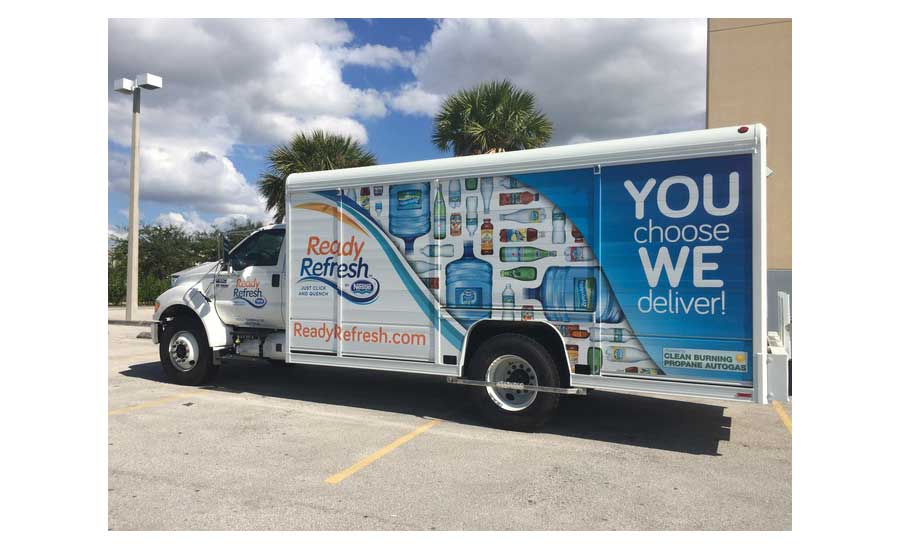Propane-powered trucks benefit beverage fleets
Nestlé Waters North America adds 155 medium-duty propane trucks

Nestlé Waters North America recently added 155 medium-duty propane-powered trucks to its fleet. (Image courtesy of Nestlé Waters North America)



There’s gas as in gasoline, and then there’s gas as in propane, often referred to as “autogas” by fuel industry insiders. In many applications, propane can deliver measurable cost savings compared with conventional gasoline and diesel powertrains.
Although older systems caused a reputation issue for propane, today’s conversion has greatly improved.
With very few propane-powered trucks currently operating in the beverage industry, Nestlé Waters North America (NWNA), Stamford, Conn., recently opted to “test the waters” with an acquisition of more than 150 Roush CleanTech propane-powered trucks.
The beauty of propane is that it can be used in virtually any application that a conventional gasoline-powered drivetrain can be used. Compared with gasoline, propane vehicles produce significantly lower emissions. Nearly 90 percent of the U.S. propane supply is domestically produced as a byproduct of natural gas and petroleum processing, with another 7 percent coming from Canada, making it a very secure source of energy.
When comparing similar fuel tank capacities, the added weight of the propane system is negligible, so, typically, no reduction in cargo capacity and/or body mounting space takes place.
The one downside to propane is a potential reduction in the range between fill-ups for similar fuel capacities. Because propane is slightly less energy-efficient than gasoline, a published range penalty of about 10-15 percent is administered, but anecdotal reports from fleet users indicate little or no loss in range.
With many fleets using propane for forklifts, it’s fairly common to already have the fuel on-site. It’s just a matter of upgrading to more powerful compressor pumps. Even without existing on-site infrastructure, many propane distributors will install the fueling equipment at little or no cost. For those using on-site fueling, propane typically qualifies for a federal tax credit for alternative fuel dispensing.
Considering the added cost of a propane engine option weighed against the lower cost of fuel, a typical fleet can reach breakeven in as little as 12-18 months, when compared with gasoline.
As much as the NWNA deployment is about reducing emissions and improving its bottom line, the move also represents a huge vote of confidence in today’s propane technology.
A strong focus on environmental stewardship is one of the key reasons that the company added 155 medium-duty propane-powered beverage delivery trucks. During the vehicles’ lifetime, the Ford F-650 trucks will reduce carbon dioxide emissions by more than 24.6 million pounds.
“Becoming a better steward of our environment is a priority for Nestlé Waters,” National Fleet Manager Bill Ardis says. “We’ve been running propane autogas vehicles since 2014. Because of the proven emissions reductions and cost savings, we knew it was the right choice to expand our fleet with this domestically produced alternative fuel.”
The new medium-duty delivery trucks, added to the company’s existing fleet of 30 propane-powered Ford trucks, also will help the company save on maintenance and fuel costs. “Autogas allows us to operate without compromising standard delivery methods, and reduces operational costs,” Ardis says.
Propane costs the company an average of $1 a gallon vs. $2 a gallon for diesel. “Customers have already noticed that our trucks operating on autogas are quieter and cleaner,” Ardis says.
Todd Mouw, vice president of sales and marketing for Roush CleanTech, says: “Fueling beverage delivery trucks with propane autogas offers the best total cost of ownership. By choosing this safe, abundant and American-made fuel, fleets around the nation have reduced operating costs and lowered their carbon footprint.”
NWNA’s propane-powered trucks initially will deploy in several markets across the country, including Los Angeles; San Francisco; Washington, D.C.; Milwaukee; and Fort Lauderdale, Fla. Deployments later in 2016 will include New York City, Boston, Dallas, Houston, Chicago, Philadelphia and Baltimore. Each of the Ford F-650 trucks is equipped with a 45-usable-gallon fuel tank and up-fitted with a Mickey side-load beverage body.
Unlike the early, carbureted propane conversion kits, the Roush propane conversions are not aftermarket add-ons installed at a local garage. Roush has a 40-year “hand-in-glove” partnership with Ford, working on new-model engineering, performance parts development, professional racing teams and custom vehicle integration projects, such as the Roush CleanTech powered F-Series trucks.
The Roush propane conversion begins with a fully assembled, gasoline-powered F-Series truck that is factory-spec’ed for use as a propane- or natural-gas truck. The key change is that its engine valves, valve guides and valve seats are built to stand up to the lower lubricity of the gaseous fuels.
Once the cab and chassis arrives at Roush, the complete gasoline fuel system is removed and then replaced with an entire fuel system purpose-built for propane and engineered to match the needs of the truck model being converted. Because of its close relationship with Ford, Roush is authorized to upload the propane-specific software codes to the truck’s factory-installed engine control module, ensuring the tightest possible integration between the Roush fuel system and the Ford chassis.
Looking for a reprint of this article?
From high-res PDFs to custom plaques, order your copy today!







